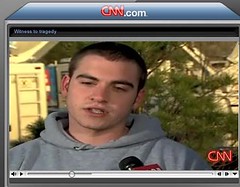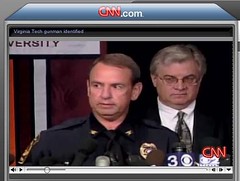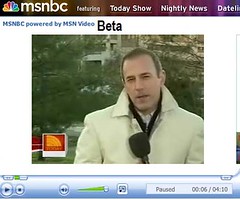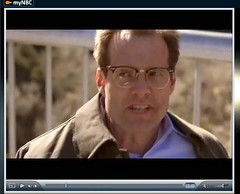Grindhouse flops! People who care about such things as who wins the weekly popularity contest called Box Office (I do care, just a little) are formulating their explanations for why the audience stayed away from a movie that seemed like such a sure thing.
Harvey Weinstein himself offers some answers. The movie was too long. The audience, especially in flyover country, didn't get the concept. Both are probably factually true, but as explanations I'm not so sure. Did the grindhouse films of the 1970s earn boffo b.o.? Maybe the Grindhouse audience-that-wasn't
did get the concept and expected crapola because the film was promoted as schlocky. Call this the so-bad-it's-bad explanation. Maybe. I haven't seen the film, so I really shouldn't opine. I will anyway.
Explaining why people go to see a movie is hard enough. Explaining why they
do not see a movie is a mug's game. It has always vexed me that we generally assume a movie is popular because people like it, and unpopular because they don't. But you can't know that you'll like a movie until you have seen it, at which point you have already paid your money. Movies that are unpopular could potentially please lots of people, but they can't know that until they pay their $8. This is different from many other cultural experiences. We rarely buy music recordings without having heard some of them first. We rarely watch TV shows regularly that we have not already tuned into and liked.
With the impossibility of really knowing the motivations of millions of non-viewers in mind, here are some more reasons why a film like Grindhouse might fail:
-No big name stars. Regardless of how hot they are on
the cover of Rolling Stone, Rose McGowan and Rosario Dawson don't open movies big.
-No clearly identifiable, bankable genre. Sorry, postmodern pastiche don't count. Neither does horror anthology.
-No pre-sold property (adaptation from a book or game, say).
-A confusing poster that makes the film seem like a revival (this is the point, but not everyone will get it).
-A title that doesn't refer to the content of the movie and that has to be explained to audiences at every opportunity. If you need to have it explained, that means you don't get it.
-The reviews. The fake trailers and the QT feature were generally well received, but few critics gave the Rodriguez feature a very positive notice, and...
-You have to sit through Planet Terror to get to Death Proof. This is a violation of a basic rule of double-feature programming: you snag the audience with the better film first, and keep them around to watch a weaker film with second billing.
-Most of the key moviegoing demographic, people my age and younger, is too young to have seen movies in grindhouses. The film tries to tap into nostalgia for something we don't remember. 70s retro is so, so dunzo.
Now for the explanations that smell to me like baloney:
-Too long. Long movies do well all the time.
-Easter weekend. Easter weekend is for family films. Yeah, and the studios used to avoid bringing out big new movies in the summer. I don't believe that people are so constrained by Easter weekend obligations as to avoid a movie they really want to see.
-There's something wrong with the audience--they're playing it safe, they're timid, they can't spot quality, etc. Joe Carnahan, who you might know as the director of the QT-manqué Smokin' Aces, writes in his
blog:
What is wrong with American moviegoers? Is there nothing NEW that they're willing to embrace? Jesus, it's the worst kind of erosion. We're making dumber and dumber films and they're becoming cash cows. God Bless '300', at least it's got balls and the director WENT for it. THAT movie is good for the business, it's good for everybody. But some of these other flicks don't even TRY because they know in the end, EXACTLY the age range and demographic driving ticket prices these days. Those monstrosities (the names of which I won't mention) are pure pieces of commerce, marketed to perfection.
Kids these days, whatevs. I've seen Blades of Glory, which won the weekend, and it's a competent, funny movie with a strong cast and a decent script. It's no Miracle of Morgan's Creek, but then Smokin' Aces ain't exactly The Godfather, is it?
Keep reading, movie fans:
Mojo,
Film Threat,
Variety,
Vidiocy,
Poland,
MovieJuice,
MovingPictureBlog.




